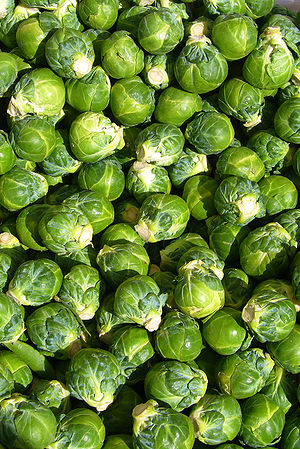| Red beans (Photo credit: Wikipedia) |
Include plenty of whole grains like brown rice, quinoa, millet, and oats as they’re a great source of fiber, minerals, protein and B complex vitamins. Buy the least processed grain types you can find, since many of the commercially prepared grains have had the nutritional and beneficial germ and bran removed.
Dark green leafy vegetables like kale, collard greens, watercress, and spinach are especially important while pregnant or lactating because they supply so many vitamins and minerals, including vitamins A and C, calcium, and iron, and folate. Dark leafy green vegetables also are rich in phytochemicals like beta carotene and lutein which protect against many forms of cancer.
| Brussels Sprouts (Photo credit: Wikipedia) |
Vegetables from the cabbage family such as broccoli, Brussels sprouts, and cabbage are wonderful sources of vitamin A, vitamin C, and calcium. They are also rich in phytochemicals that have anticancer properties. Dark green leafy vegetables and cabbage family vegetables provide important nutrients that help to promote a plentiful milk supply for your baby.
Nuts and seeds are good sources of fiber, protein, minerals, and essential fatty acids. Be sure to eat flaxseeds, pumpkin seeds, almonds and walnuts to get omega-3 fatty acids, which are important for baby’s brain and nervous system development as well as your own health. Nuts and seeds can be eaten raw or toasted, and work great in a salad made of dark leafy green vegetables.
Lastly, it’s important to drink plenty of water, and make sure you’re getting plenty of rest during this time. A well-hydrated, well-rested body recovers more quickly, and ready to take on the challenges that life with a newborn baby brings with it!



No comments:
Post a Comment